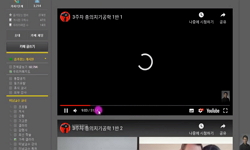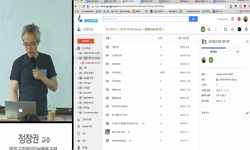Purpose: This study is to assess the level of student perceptions, academic achievement, satisfaction, and their relationships in a medical-surgical nursing course using team-based learning (TBL). Method: Four-hour TBL sessions were given in a structu...
http://chineseinput.net/에서 pinyin(병음)방식으로 중국어를 변환할 수 있습니다.
변환된 중국어를 복사하여 사용하시면 됩니다.
- 中文 을 입력하시려면 zhongwen을 입력하시고 space를누르시면됩니다.
- 北京 을 입력하시려면 beijing을 입력하시고 space를 누르시면 됩니다.
https://www.riss.kr/link?id=A100292469
- 저자
- 발행기관
- 학술지명
- 권호사항
-
발행연도
2012
-
작성언어
Korean
-
주제어
간호교육 ; 간호학생 ; 인지도 ; 만족도 ; Nursing education ; Nursing student ; Learning ; Personal satisfaction
-
KDC
512
-
등재정보
KCI등재,SCOPUS
-
자료형태
학술저널
-
수록면
239-247(9쪽)
-
KCI 피인용횟수
44
- DOI식별코드
- 제공처
-
0
상세조회 -
0
다운로드
부가정보
다국어 초록 (Multilingual Abstract)
Purpose: This study is to assess the level of student perceptions, academic achievement, satisfaction, and their relationships in a medical-surgical nursing course using team-based learning (TBL). Method: Four-hour TBL sessions were given in a structured three-phase sequence in a cohort of 261 second year nursing students. Results: Mean perceptions of TBL was 6.64±5.11, and 8.30±4.11 for perceptions of teamwork. On a 7-point scale, the mean satisfaction score was 4.85±1.41, and 64.0% of nursing students were satisfied with TBL compared to lecture. Group readiness assurance test score was significantly higher than individual readiness assurance test score (t=-16.76, p<.001). Perceptions of TBL (F=1.40, p=.245), perceptions of team work (F=1.55, p=.202) and satisfaction (F=0.81, p=.489) was not different by the level of students’ academic achievement on items related TBL. Conclusion: Results indicates that TBL was an effective instructional strategy including favorable perceptions and satisfaction for nursing students. TBL could be an adjunct educational strategy for undergraduate nursing education.
참고문헌 (Reference)
1 이영민, "팀 기반 학습" 학지사 2009
2 박인숙, "치위생교육과정의 치면세마 교육에 대한 팀기반학습(Team-Based Learning)의 효과" 대한구강보건학회 33 (33): 125-133, 2009
3 조아라, "의학교육에서의 효과적인 팀 바탕학습 운영 방안 및 기대효과" 한국의학교육학회 22 (22): 47-55, 2010
4 백선용, "의학 강의의 질 개선을 위한 동영상 수업 분석 및 그 활용도 연구" 한국의학교육학회 23 (23): 263-274, 2011
5 김근곤, "문제중심학습을 위한 간호교육과정 통합 방안에 관한 고찰" 14 (14): 149-164, 2002
6 Koles, P. G., "The impact of team-based learning on medical students' academic performance" 85 (85): 1739-1745, 2010
7 Murad, M. H., "The effectiveness of self-directed learning in health professions education: A systematic review" 44 (44): 1057-1068, 2010
8 Chung, E. K., "The effect of team-based learning in medical ethics education" TAYLOR & FRANCIS LTD 31 (31): 1013-1017, 200911
9 Sisk, R. J., "Team-based learning: Systematic research review" 50 (50): 665-669, 2011
10 Mennenga, H. A., "Team-based learning: Engagement and accountability with psychometric analysis of a new instrument" University of Nevada 2010
1 이영민, "팀 기반 학습" 학지사 2009
2 박인숙, "치위생교육과정의 치면세마 교육에 대한 팀기반학습(Team-Based Learning)의 효과" 대한구강보건학회 33 (33): 125-133, 2009
3 조아라, "의학교육에서의 효과적인 팀 바탕학습 운영 방안 및 기대효과" 한국의학교육학회 22 (22): 47-55, 2010
4 백선용, "의학 강의의 질 개선을 위한 동영상 수업 분석 및 그 활용도 연구" 한국의학교육학회 23 (23): 263-274, 2011
5 김근곤, "문제중심학습을 위한 간호교육과정 통합 방안에 관한 고찰" 14 (14): 149-164, 2002
6 Koles, P. G., "The impact of team-based learning on medical students' academic performance" 85 (85): 1739-1745, 2010
7 Murad, M. H., "The effectiveness of self-directed learning in health professions education: A systematic review" 44 (44): 1057-1068, 2010
8 Chung, E. K., "The effect of team-based learning in medical ethics education" TAYLOR & FRANCIS LTD 31 (31): 1013-1017, 200911
9 Sisk, R. J., "Team-based learning: Systematic research review" 50 (50): 665-669, 2011
10 Mennenga, H. A., "Team-based learning: Engagement and accountability with psychometric analysis of a new instrument" University of Nevada 2010
11 Grady, S. E., "Team-based learning in pharmacotherapeutics" 75 (75): 136-, 2011
12 Vasan, N. S., "Team-based learning in anatomy: An efficient, effective, and economical strategy" 4 (4): 333-339, 2011
13 Clark, M. C., "Team-based learning in an undergraduate nursing course" 47 (47): 111-117, 2008
14 Nieder, G. L., "Team-based learning in a medical gross anatomyand embryology course" 18 (18): 56-63, 2005
15 Michaelsen, L. K., "Team-based learning for health professions education" Stylus Publishing 2008
16 McInerney, M. J., "Team-based learning enhances long-term retention and critical thinking in an undergraduate microbial physiology course" 4 : 3-12, 2003
17 Thompson, B. M., "Team-based learning at ten medical schools: Two years later" 41 (41): 250-257, 2007
18 Feingold, C. E., "Student perceptions of team learning in nursing education" 47 (47): 214-222, 2008
19 Faul, F., "G*Power 3: A flexible statistical power analysis program for the social, behavioral, and biomedical sciences" 39 (39): 175-191, 2007
20 Chan, D., "Development of the clinical learning environment inventory: Using the theoretical framework of learning environment studies to assess nursing students' perceptions of the hospital as a learning environment" 41 (41): 69-75, 2002
21 Shin, K. R., "Clinical supervisors' satisfaction with the clinical competence of newly employed nurses in Korea" ELSEVIER SCIENCE INC 58 (58): 129-134, 201005
22 Berkow, S., "Assessing new graduate nurse performance" 38 (38): 468-474, 2008
23 Vasan, N. S., "A survey of student perceptions of team-based learning in anatomy curriculum: Favorable views unrelated to grades" 2 (2): 150-155, 2009
24 Haidet, P., "A controlled trial of active versus passive learning strategies in a large group setting" 9 (9): 15-27, 2004
25 Tan, N. C., "A controlled study of team-basedlearning for undergraduate clinical neurology education" 11 : 91-, 2011
동일학술지(권/호) 다른 논문
-
간호사 신문활용교육(NIE)이 간호학생의 자기효능감 및 전문직 자아개념에 미치는 효과
- 한국간호교육학회
- 박선일(Park, Seon Il)
- 2012
- KCI등재,SCOPUS
-
간호대학생의 보완대체요법에 대한 태도 및 교과목 개설희망 종류
- 한국간호교육학회
- 정명실(Chung, Myung Sill)
- 2012
- KCI등재,SCOPUS
-
- 한국간호교육학회
- 김인경(Kim, In Kyung)
- 2012
- KCI등재,SCOPUS
-
시뮬레이터와 표준화 환자를 이용한 간호 시뮬레이션 교육의 이론적 기틀 개발
- 한국간호교육학회
- 서은영(Eunyoung, E. Suh)
- 2012
- KCI등재,SCOPUS
분석정보
인용정보 인용지수 설명보기
학술지 이력
| 연월일 | 이력구분 | 이력상세 | 등재구분 |
|---|---|---|---|
| 2024 | 평가예정 | 계속평가 신청대상 (등재유지) | |
| 2019-01-01 | 평가 | 우수등재학술지 선정 (계속평가) | |
| 2016-01-01 | 평가 | 등재학술지 유지 (계속평가) |  |
| 2012-01-01 | 평가 | 등재학술지 유지 (등재유지) |  |
| 2009-01-01 | 평가 | 등재학술지 선정 (등재후보2차) |  |
| 2008-01-01 | 평가 | 등재후보 1차 PASS (등재후보1차) |  |
| 2006-01-01 | 평가 | 등재후보학술지 선정 (신규평가) |  |
학술지 인용정보
| 기준연도 | WOS-KCI 통합IF(2년) | KCIF(2년) | KCIF(3년) |
|---|---|---|---|
| 2016 | 2.49 | 2.49 | 2.81 |
| KCIF(4년) | KCIF(5년) | 중심성지수(3년) | 즉시성지수 |
| 2.87 | 3.05 | 3.548 | 0.42 |





 ScienceON
ScienceON DBpia
DBpia




